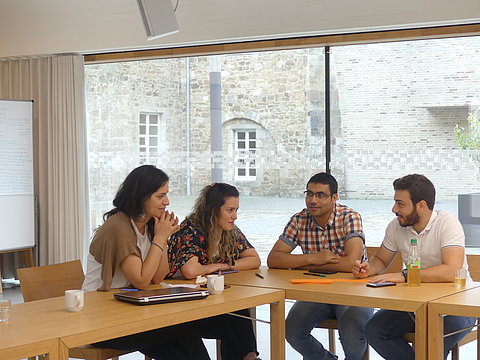The seminar was primarily aimed at KAAD scholarship holders from this region, but was also open to interested scholars from the other departments. A total of 12 students took part in the seminar.
Education is a central issue in the states of the Middle East, where young people form the majority of the population. It is directly related to economic and social conditions and different traditions. The aim of the seminar was to trace the current state of education in the region, to work out the individual aspects and to look at possible solutions.
Prof. Dr. Abdeljalil Akkari (University of Geneva), member of the Swiss UNESCO Commission, introduced the participants to the topic and the global Education 2030 Agenda. Against the background of his research and his international experience and expertise in education policy, he gave both a broad overview and deep insights: The countries of the region have achieved great successes in the quantity of education in recent years (especially reducing the illiteracy rate and increasing the number of degrees), but have not increased the quality of education. In many cases, there is a contrast between state universities (without fees and poorly equipped) and private universities (with high fees and well equipped). Dr. Daniele Cantini (University of Halle) then discussed this situation in detail, using Egypt and its higher education policy as an example. He referred to current plans of the Egyptian government, among others in the context of the large-scale project of the ‘new capital’ of Egypt. There, places and resources are planned for state and private educational institutions, including universities.
In several group works and in the plenary, personal (positive and negative) experiences of the individual educational paths were traced and classified. It became apparent that informal education, outside the traditional institutions, is particularly significant. Based on the work results of the groups, the following recommendations for the improvement of education in the Middle East were elaborated:
1. free access to education for all and compulsory basic education (primary education)
2. new concepts for education with a focus on methods, soft skills and critical thinking
3. reducing the discrepancy between public and private universities
4. compulsory training of teachers in modern teaching and learning methods
5. consistently implement best practice from other countries and regularly evaluate national education policy
6. improve the ethics and ethos of education
On the first day, the leisure programme dealt with the surroundings of the conference centre, especially with the history of the Cistercians and the Christian commitment to peace after the Second World War. This was deepened during a guided tour through the Altenberg Cathedral and the area around it and could be experienced in walks and explorations in the surroundings. On the second day, the participants received an introduction to the art of archery, where concentration and a relaxed mind were required to hit the target.
The seminar was accompanied by Prof. Dr Ulrich Engel spiritually. In the morning impulses and the joint intercultural-interreligious closing prayer, there were echoes of asking and giving (Mt 7:7-10), which is socially significant and spiritually central.
At the end of the seminar, the participants decided to further develop and practically implement the developed recommendations in order to initiate changes and improvements.

![[Translate to Englisch:] [Translate to Englisch:]](/fileadmin/_processed_/d/2/csm_Nahost-Seminar_08_22__1__d3ce316dae.jpg)
![[Translate to Englisch:] [Translate to Englisch:]](/fileadmin/_processed_/a/a/csm_Nahost-Seminar_08_22__3__4f0b86f09b.jpg)



